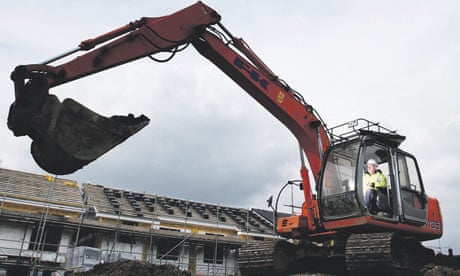More than 100 British construction firms, including Balfour Beatty and Kier Group, face fines totalling more than £200m tomorrowwhen the Office of Fair Trading concludes its investigation into bid rigging.
The OFT will announce to the stock exchange the results of its five-year investigation into the cartel behaviour which it claims has artificially inflated the cost of £3bn of public and private sector contracts.
The watchdog has accused 112 firms of colluding to artificially drive up the price of contracts put out to tender between 2000 and 2006. The contracts investigated include several public sector projects to build social housing, schools, hospitals and universities.
The OFT has the power to fine the companies up to 10% of their turnover. One lawyer who has been involved in the investigation said: "The headline fines will be high." He added that the OFT, which has devoted dozens of investigators and lawyers to the inquiry, will also be under pressure to justify going to such lengths and levy suitably high penalties.
The OFT may allow construction firms hit by the property downturn to pay the fines in instalments.
About half of those accused, thought mostly to be smaller firms, have admitted their guilt to reduce their fines to 1% or 2% of turnover. The Local Government Association (LGA) is demanding that the authorities that have fallen victim to the scam receive the proceeds of the fines, which could total as much as £1bn.
An LGA spokesman said: "There can be no excuse for any form of cover price or bid rigging which leaves councils and taxpayers picking up the bill."
The construction industry has warned that fines could be disproportionately high because the industry typically has high turnover and small profit margins. The National Federation of Builders (NFB) – which represents about 1,500 small and medium sized companies – also warned that many of the smaller offending firms could go out of business, especially if blacklisted by local authorities.
Julia Evans, chief executive of the NFB, said: "There are a lot of people out there waiting with bated breath to find out the extent of the fines levied by the OFT. As well as the size of the fines themselves, the other area of concern for us is that local authorities could end up unfairly blacklisting these firms. If this happens, many of the smaller contractors affected could go out of business."
The Office of Government Commerce, which gives advice on public spending, will also set out guidance to local authorities on how to respond to the OFT's findings and whether to tender contracts to guilty firms.
Privately, the industry has admitted that the practice of bid rigging and cover price fixing was widespread for some time before the OFT intervened. The most serious practice of bid rigging involved companies that had no intention of winning a contract colluding to place deliberately high bids to make a rival's lower bid appears more competitive.
The more common practice of cover pricing involved companies tabling artificially high bids for contracts they had no intention of winning. They would do this if they did not have the resources to carry out the work, but wanted to remain on the client company's list of preferred bidders for future tenders.
Both practices had the effect of inflating the final price of the contract. The industry claims that firms no longer engage in such practices, which were more effective when the lowest priced bids – rather than "best value" benchmark used now – typically won the business.
The OFT said last year that in the course of its investigation, which began in 2004, it found evidence of cover pricing in thousands of tender processes in the construction industry involving many more companies than the 112 named. But it focused the investigation, the largest of its kind, on 240 alleged infringements in England and raided the offices of 57 named firms.
The list of 112 companies investigated include large firms such as Balfour Beatty, Carillion, Kier Group, Henry Boot and Interserve. Many others are small family-run businesses.
John Fingleton, OFT chief executive, said last year: "Cartel activity of the type alleged today harms the economy by distorting competition and keeping prices artificially high."This investigation, together with the OFT's previous decisions in the roofing sector, will hopefully send out a strong message to the construction industry about the seriousness with which we view suspected anti-competitive behaviour. Businesses have no excuses for not knowing and abiding by the law."
